




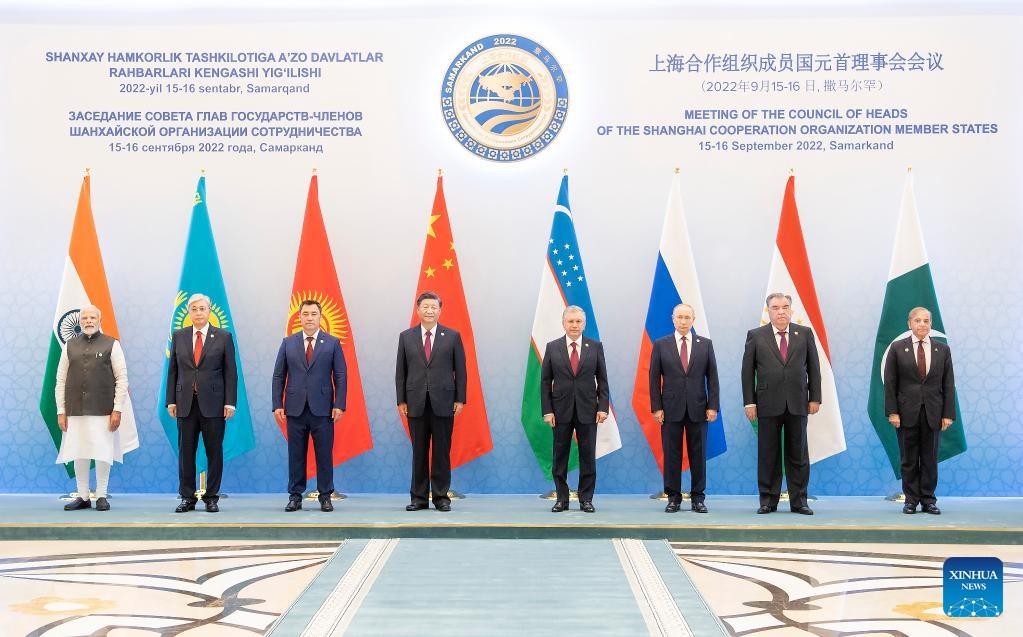
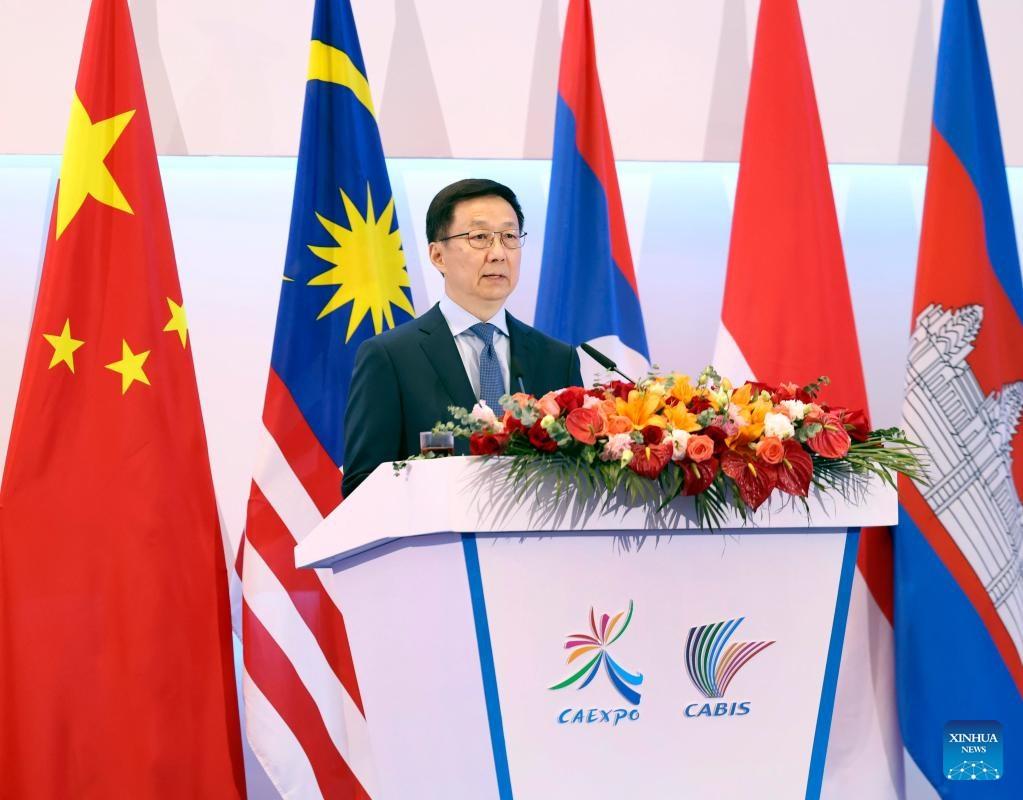
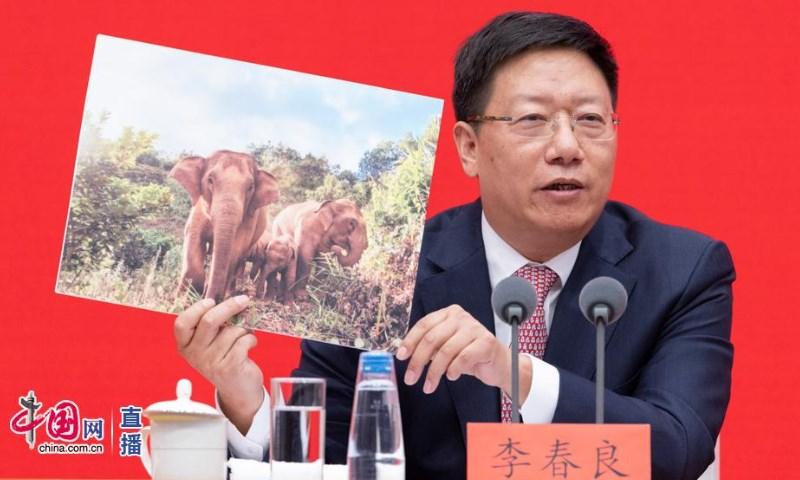









SAMARKAND, Uzbekistan, Sept. 16 (Xinhua)
Chinese President Xi Jinping on Friday attended here the restricted session of the 22nd meeting of the Council of Heads of State of the Shanghai Cooperation Organization (SCO).
Chinese President Xi Jinping poses for a group photo with other leaders of the Shanghai Cooperation Organization (SCO) member states before the restricted session of the 22nd meeting of the Council of Heads of State of the SCO at the International Conference Center in Samarkand, Uzbekistan, Sept. 16, 2022. Xi attended the restricted session here on Friday. (Xinhua/Li Tao)

The meeting was chaired by Uzbek President Shavkat Mirziyoyev, and attended by leaders of SCO member states including Russian President Vladimir Putin, Kazakh President Kassym Jomart Tokayev, Kyrgyz President Sadyr Zhaparov, Tajik President Emomali Rahmon, Indian Prime Minister Narendra Modi, and Pakistani Prime Minister Shehbaz Sharif. The leaders exchanged views on SCO development and major international and regional issues bearing on the political and economic situation in the region.

At 9:55 a.m. local time, Xi and leaders of other SCO member states arrived at the Samarkand Congress Center and received warm welcome from Mirziyoyev.
The leaders took a group photo before the restricted session started.
In his statement, Xi spoke highly of Uzbekistan's hard work and important contribution to preparing for the Samarkand summit and advancing SCO's development under its presidency.
Xi pointed out that since the founding of the SCO more than twenty years ago, it has upheld the Shang-


hai Spirit and succeeded in exploring a new path for the development of international organizations. There is much we can draw on from its rich practices, he said.
It is important to forge political trust, Xi said, adding that guided by the vision of forging enduring friendship and peace among the SCO member states, the member states respect each other's core interests and choice of development path and support each other in achieving peace, stability, development and rejuvenation.
BEIJING, Sept. 19 (Xinhua)
Chinese President Xi Jinping sent a congratulatory letter to the seventh China Eurasia Expo, which opened Monday in Urumqi, capital of Xinjiang Uygur Autonomous Region.
Full of vitality and potential for development, the Eurasian continent is a key region for international cooperation on jointly building the Belt and Road, Xi said in his letter.
In recent years, China's Xinjiang has given full play to its location advantages to actively advance the construction of the core area of the Silk Road Economic Belt and promote the interconnectivity, mutually beneficial cooperation and common development between China and Eurasian countries, with positive results being achieved, said Xi.
He stressed that China is willing to work with other countries to promote the Silk Road spirit that incorporates peace and cooperation, openness and inclusiveness, mutual learning as well as shared benefits, with the China Eurasia Expo being a platform.
Meanwhile, China is ready to work with other countries to pursue highstandard and sustainable development that benefits the people, and explore new spheres for Eurasian cooperation, elevate the cooperation to new levels, and promote common development and prosperity, Xi added.
The expo is co hosted by the Ministry of Commerce, the Ministry of Foreign Affairs, the China Council for the Promotion of International Trade, and the People's Government of Xinjiang Uygur Autonomous Region.


The registration for this year's Orchid Awards has closed. As of noon
on September 8, the secretariat of the Orchid Awards had received 347 entries including 33 organizations from nearly 80 countries and regions.
The Awards recognizes non Chinese nationals and organizations who have contributed to the cause of international cultural exchanges, and have committed to promoting cultural exchanges between China and the rest of the world as well as mutual learning between Chinese and other civilizations.
The Awards falls into three prize categories: Lifetime Honorary Prize, Outstanding Achievement Prize, and Friendship Envoy Prize. Selections will be based on the achievements, contributions, and international influence of the candidates. The Awards for this year will be presented to eight to 10 individuals and organizations. The Awards is established by China International Communications Group (CICG), and CICG's China Center for International Communication Development serves as the secretariat. The Expert Committee of the Awards will pick winners according to the selection criteria. The list of winners will be disclosed on the official CICG website.
Foreign Ministry Spokesperson Mao Ning’s Regular Press Conference on September 19, 2022
President Xi Jinping’s trip to Central Asia is an important landmark visit undertaken at a crucial and historic juncture. As the trip came to an end, State Councilor and Foreign Minister Wang Yi gave a detailed briefing.
Within a 48 hour stay in the two Central Asian countries, President Xi attended nearly 30 multilateral and bilateral events. The visit has had many highlights and created fruitful outcomes. With its facilitation, the SCO has entered a new phase of development. The visit also successfully steered China’s relations with relevant countries to new levels.
President Xi Jinping delivered an important speech at the Samarkand Summit, where he put forward major initiatives and proposals on greater unity among the member states and the future development of the SCO. He emphasized the need to enhance mutual support, expand security cooperation, deepen practical cooperation, enhance people to people and cultural exchanges, and uphold multilateralism.
The Chinese side also announced that it is ready to establish a China SCO
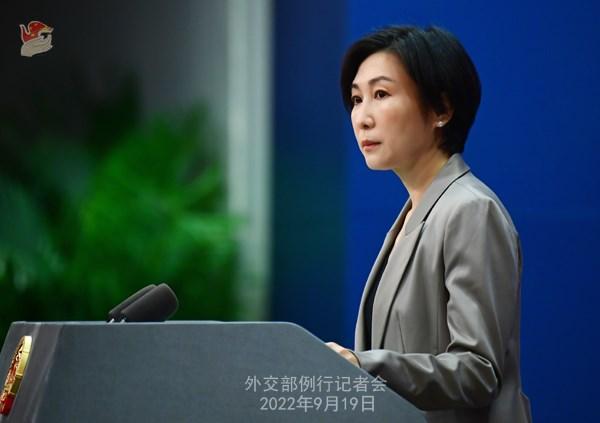


base for training counter terrorism personnel, host a forum on industrial and supply chains, set up a China SCO Big Data Cooperation Center, and provide developing countries in need with emergency humanitarian assistance of grain and other supplies worth 1.5 billion yuan. These proposals and initiatives of China have received a positive response from other countries. The Samarkand Summit set a new record in three aspects. First, it adopted 44 outcome documents, the highest number recorded. Second, it saw the broadest participation, with the attendance of leaders of 14 countries including SCO member states, observer states and the Presidency’s guests, and heads of nine international organizations and institutions such as the UN. Third, it marked the largest round of expansion for the SCO, as a memorandum of obligations on Iran’s membership was signed, the procedure for Belarus’s accession was started, the status of SCO dialogue partners was
granted to Egypt, Saudi Arabia and Qatar, and agreement was reached on admitting Bahrain, the Maldives, the UAE, Kuwait, and Myanmar as new dialogue partners.
During President Xi Jinping’s fruitful state visits to Kazakhstan and Uzbekistan, a wide ranging consensus was reached on the future direction and priorities of cooperation, writing a new chapter of good neighborly friendship between China and the two countries. The launch of the concept of a community with a shared future between China and Kazakhstan and between China and Uzbekistan at the bilateral level is an integral part of the building of a community with a shared future for mankind. It will better benefit the people of the three countries and contribute to regional peace and development.
President Xi Jinping’s trip to Central Asia is an important landmark visit undertaken at a crucial and historic juncture.
The world's first cloned arctic wolf lies beside a lawn, as shown in a video released by the Beijing based Sinogene Biotechnology Co on Sept 19, 2022. [Photo provided by Sinogene Biotechnology Co via globaltimes.cn]
A Beijing based gene company announced the debut of the world's first cloned arctic wolf via video on Monday, marking the 100th day since its birth in a Beijing lab.

Born on June 10, the wolf pup is energetic and in very good health, as evident in the video shown during the press conference.

Its donor cell came from the skin samples of a wild arctic wolf named Maya, who had been introduced from Canada to Harbin Polarland. Its oocyte was from a female dog in estrus and its surrogate mother was a beagle, according to Zhao Jianping, the deputy general manager of the Beijing based Sinogene Biotechnology Co.
"This is not only the achievement of

our research cooperation with Harbin Polarland, but also our new attempt and breakthrough in the protection and breeding of wild and endangered animals.
From the start of the project in 2020 to the healthy birth of the wolf pup in June of this year, we have overcome many difficulties. Looking back, it's worth it," Mi Jidong, the company's general manager, said during a press conference in Beijing on Monday.
The birth of the world's first cloned arctic wolf is a milestone for the application of cloning technology and is of great significance to biodiversity, the protection of wildlife, and the restoration of endangered species in the world, researchers believe.
"Cloning technology is a breeding method different from natural reproduction, especially for animals with small populations and who are difficult to extract germ cells for. It is an effective way to protect gene diversity and increase species population size," said Lai Liangxue, a researcher from the Guangzhou Institute of Biomedi-
cine and Health, Chinese Academy of Sciences.
Lai further explained that the cloned animals still have the ability to reproduce if they have intact fertilized eggs. The physical conditions of a cloned animal are no different from the animal that serves as its blueprint, and they can form gametes to conduct reproductive activities.
It is understood that the arctic wolves' ancestral origin survived the Ice Age over 300,000 years ago. They have the ability to withstand extremely cold temperatures and inhabit many snowy regions around the globe.
However, due to constant threat from poachers and erosion of their living space, arctic wolves are now included in the International Union for Conservation of Nature's Red List of Endangered Species.
It is reported that at present, the technology of cloning arctic wolves has gained strong value in its application, and the company has announced that another male cloned arctic wolf is expected to be delivered in the near future.
Chinese Vice Premier Han Zheng on Friday called on China and the Association of Southeast Asian Nations (ASEAN) to take the opportunity of the implementation of the Regional Comprehensive Economic Partnership (RCEP) to build a closer community with a share future.
Han, also a member of the Standing Committee of the Political Bureau of the Communist Party of China Central Committee, made the remarks at the opening ceremony of the 19th China ASEAN Expo and the China ASEAN Business and Investment Summit in Nanning, capital of south China's Guangxi Zhuang Autonomous Region.
Han called on the two sides to further enhance strategic alignment, comprehensively implement the Joint Statement of the ASEAN China Special Summit to Commemorate the 30th Anniversary of ASEAN China Dialogue Relations, build their comprehensive strategic partnership well and discuss the joint implementation of the Global Development Initiative and the Global Security Initiative.
He called on the two sides to promote economic and trade cooperation, ensure the high quality implementation of the RCEP and work toward an improved version of the China ASEAN free trade zone.
China will increase the import of high quality products, particularly agricultural products from the ASEAN countries, said Han, calling on the two sides to facilitate a deeper integration of the industrial, supply and value chains. The vice premier called on China and the ASEAN countries to promote the interconnectivity of infrastructure and the joint construction of a new international land sea trade corridor.
On green development cooperation, Han called on the two sides to enhance cooperation in areas including environmental protection, climate change response and biodiversity, promote the green upgrading of industrial structures, jointly develop clean energy, and strengthen marine ecosystem protection and the sustainable utilization of marine resources.
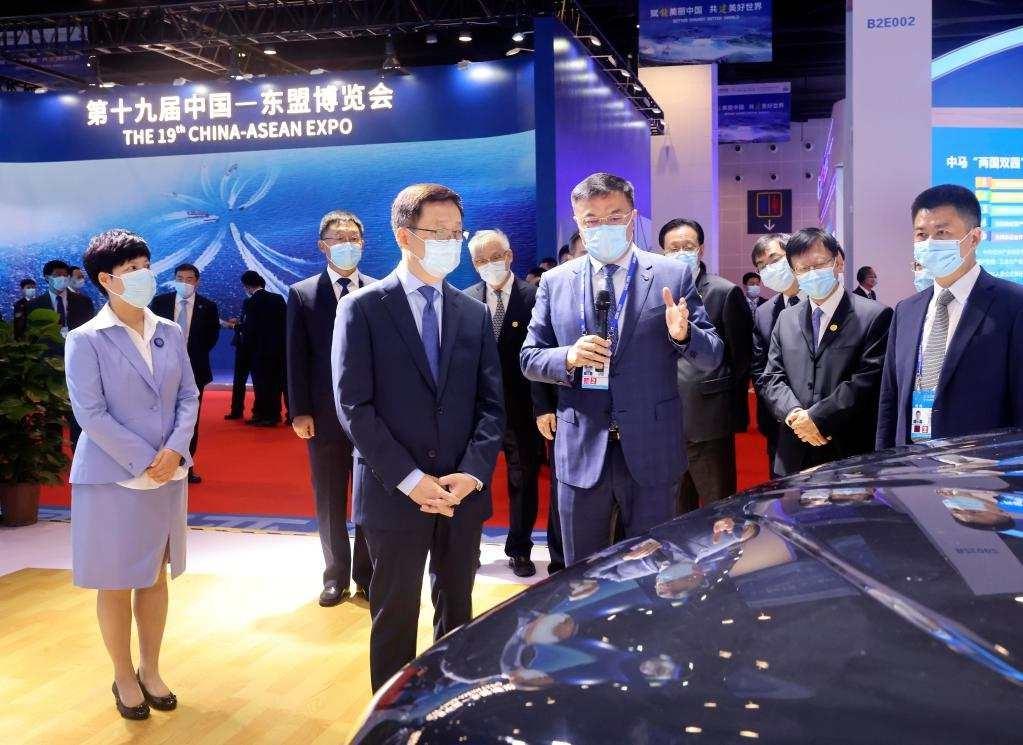
On promoting people to people exchanges, Han said the two sides should enhance the research, development and production of COVID 19 vaccines, vigorously promote culture, education, youth, local level and media exchanges and cooperation, and consolidate the foundation of public opinion for people to people exchanges.


Speeches were delivered via video by Malaysian Prime Minister Ismail Sabri Yaakob, Cambodian Prime Minister Samdech Techo Hun Sen, Philippine President Ferdinand Romualdez Marcos, Lao Deputy Prime Minister Sonexay Siphandone, Singapore's Deputy Prime Minister and Coordinating Minister for Economic Policies Heng Swee Keat, Thai Deputy Prime Minister and Foreign Minister Don Pramudwinai, Vietnamese Deputy Prime Minister Pham Binh Minh and ASEAN Secretary General Lim Jock Hoi. After the opening ceremony, Han toured the exhibition hall and exchanged views with owners of participating enterprises, noting that China will unswervingly open up wider to the outside world and actively foster a market -oriented and law-based international business environment.
The RCEP is unlocking the potential of the integrated market and injecting strong impetus into China ASEAN cooperation, Han said, stressing that China welcomes foreign companies to invest and do business in China, as well as encouraging Chinese companies to actively explore the international market.
The 15 wild Asian elephants that went on a 1,400-kilometer "exodus" in 2021 in Southwest China's Yunnan Province are now back in their original habitat in Xishuangbanna and the two calves born during their trek have grown to 300 kilograms, the National Forestry and Grassland Administration revealed on Monday.
The herd of Asian elephants came into the global spotlight in 2021 after their unusual northward journey since March 2021.
The elephants returned to their original habitat in Xishuangbanna after the 124 day trek which covered a distance of over 1,400 kilometers, said Li Chunliang, deputy director of the National Forestry and Grassland Administration, during a press conference on Monday. At the Monday conference, Li presented a photo taken of four elephants including two calves which drew much public attention back in 2021 because they were born during the trek. The photo was taken by frontline monitoring staff. According to Li, the calves are living a very healthy life and have grown to an estimated 300 kilograms now. They weighed 100 kilograms when they were born
Li said that China has established a new nature reserve system composed of national parks, nature reserves and various types of natural parks.


A first batch of five national parks the Sanjiangyuan National Park, the Wuyi Mountain National Park, the Giant Panda National Park, the Northeast China Tiger and Leopard National Park and the Hainan Tropical Rainforest National Park have been officially established. Two national botanic gardens in Beijing and Guangzhou have also been set up. Over the past decade, China has stepped up efforts in promoting the harmonious coexistence of humans and nature, and remarkable results in preserving natural resources have been achieved, with 74 percent of wildlife species under special protection and 65 percent of higher plant communities being effectively preserved.
 Deputy director of the National Forestry and Grassland Administration Li Chunliang presents a photo of the four Asian elephants on Monday. Photo: China.com.cn
Deputy director of the National Forestry and Grassland Administration Li Chunliang presents a photo of the four Asian elephants on Monday. Photo: China.com.cn
BEIJING, Sept. 19 (Xinhua)
Decked up in fancy attires, Li Fengwei and her teammates are busy lately, rehearsing for an upcoming square dance competition.
19 September 2022 Members of a dance troupe at the cultural center in Beijing's Xicheng District exercise at a park in Beijing, capital of China, Sept. 8, 2022. Decked up in fancy attires, Li Fengwei and her teammates are busy lately, rehearsing for an upcoming square dance competition. (Xinhua/Tai Sicong)
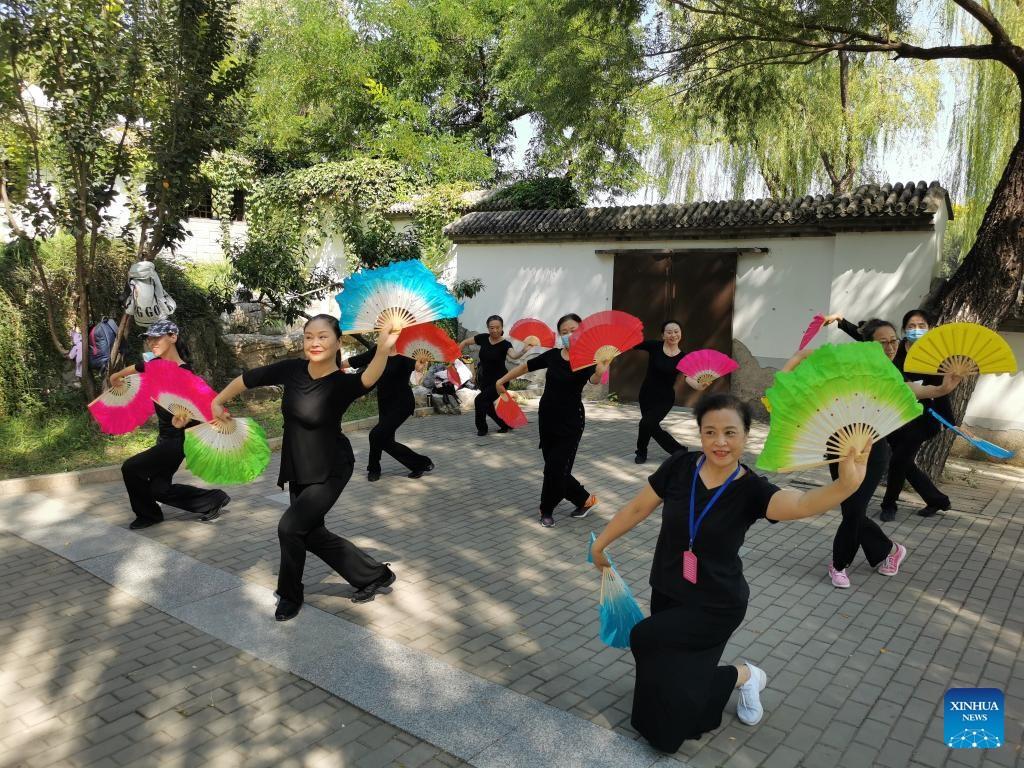
Li, 60, is a member of a dance troupe at the cultural center in Beijing's Xicheng District. Established in 2003, the team is currently comprised of more than 40 enthusiastic square dancers with an average age of over 62.
"We started from zero basics and everyone had different physical conditions and levels but we persevered with our love and passion for dance," said Li, who joined the team after retirement.
In addition to dancing, Zhao Huijie, 59, a member of the dance troupe, has taught herself basic editing skills so that she can arrange better music for their square dances. Her teammate Kong Hangyu has regained a
healthy physique since she began dancing.
As the instructor of the dance troupe, Yue Xiaodong is delighted to see the positive impact square dancing has had on the lives of these elderly dancers. "Square dancing has created great value for themselves and helped them receive recognition," he said.
Featuring a strong sense of empathy and engagement, square dancing has received widespread public attention in China.
Yuan Liang, an official with the Beijing cultural center, said that there are currently more than 4,000 square dance groups in Beijing, and theirchoreography and costumes feature local char-

acteristics.

Chinese square dancers have performed in countries such as France, New Zealand and the United States over the past years. "Square dance differs from other professional dance genres as it can incorporate moves from any other dance style. It is not only a grassroots cultural activity that comes from people's daily lives but also closely linked with Chinese traditional culture," Yue said.
For the first time, square dance was included as a separate category in the recently announced Qun Xing national award for culture and arts in China. Li's dance team was awarded there.
"The award serves as a motivation for all the ordinary people who join the square dance activities," said Yuan, expressing hopes that square dancing can promote Chinese culture across the world.
China will take measures to boost foreign investment, with the manufacturing industry as a priority, the country's top economic planner said on September 19.
China will facilitate the exchange of business personnel of foreign companies on the premise of strictly implementing epidemic prevention, as part of the efforts to address their outstanding problems, Meng Wei, spokesperson for the National Development and Reform Commission, told a press conference. Alignment between the foreign trade and foreign companies and their upstream and downstream counterparts will also be strengthened, Meng said.
China is accelerating the revision of the industry catalog that encourages foreign investment, with a focus on channeling more investment into sectors such as advanced manufacturing, high-end technologies and
modern services, as well as the central, western and northeastern regions of the country, Meng noted.
The country will also organize promotion activities for industry investment and cooperation to set up an exchange platform for multinationals and localities.
Despite some factors brought about by the complex external environment denting the confidence of foreign investors, "China's foreign investment utilization saw rapid expansion this year," Meng said.
Foreign direct investment into the Chinese mainland, in actual use, expanded 16.4 percent year on year to 892.74 billion yuan in the first eight months of the year, showed data from the Ministry of Commerce Monday. In U.S. dollar terms, the inflow went up 20.2 percent year on year to 138.41 billion dollars.
Foreign direct investment (FDI)

into the Chinese mainland, in actual use, expanded 16.4 percent year on year to 892.74 billion yuan in the first eight months of the year, the Ministry of Commerce said on September 19.
In U.S. dollar terms, the inflow went up 20.2 percent year on year to $138.41 billion.
The service industry saw FDI inflow jump by 8.7 percent year on year to 662.13 billion yuan, while that of high tech industries surged by 33.6 percent from a year earlier, data from the ministry showed.

Specifically, FDI in high tech manufacturing rose 43.1 percent from the same period a year ago, while that in the high-tech service sector surged 31 percent year on year.
During the period, investment from the Republic of Korea, Germany, Japan, and the United Kingdom climbed by 58.9 percent, 30.3 percent, 26.8 percent, and 17.2 percent, respectively.
FDI flowing into the country's western region reported a year on year increase of 43 percent, followed by 27.6 percent in the central region and 14.3 percent in the eastern region.
Noting that it is important to pursue win win cooperation, Xi said that the SCO member states accommodate each other's interests, stay true to the principle of consultation and cooperation for shared benefits, enhance synergy between our respective development strategies, and keep to the path of win win cooperation toward common prosperity.
It is important to treat each other as equals, the Chinese president said, adding that the SCO member states are committed to the principle of equality among all countries regardless of their size, consensus based decision making, and addressing issues through friendly consultations. The SCO member states reject the practice of the strong bullying the weak or the big bullying the small, he noted.
Noting that it is important to advocate openness and inclusiveness, Xi said that the SCO member states stand for harmonious coexistence and mutual learning between different countries, nations and cultures, dialogue between civilizations and seeking common ground while shelving differences. We are ready to establish partnership and develop win win cooperation with other countries and international organizations that share our vision, he said.
Xi stressed that the world today is not a peaceful place. Rivalry between two sets of policy choices unity or division, cooperation or confrontation is getting more acute. This brings shocks to world peace and stability and is detrimental to the long term development of

the region.
In the face of the complex situation, Xi urged the SCO member states to keep the SCO on the right course, deepen cooperation in various fields, and continue to foster a favorable environment for the development and rejuvenation of member states.
Xi outlined several priorities going forward.
First, staying committed to the Shanghai Spirit and enhancing solidarity and cooperation. It is important that the SCO
stay true to its founding mission, increase mutual trust, and join forces to cope with the complex changes in the external environment. Member states need to continue to support each other on matters concerning each other's core interests and major concerns and serve as a strong backing for each other's development and rejuvenation.

Second, maintaining strategic independence and safeguarding regional stability.
Member states need to advocate the vision of common, comprehensive, cooperative and sustainable security and reject any attempt to create bloc confrontation and damage regional stability.
Bearing in mind the security needs of countries in the region, they should build consensus on security cooperation, and work together to protect sustained stability and security in the region. The SCO should enhance its law enforcement cooperation and prevent terrorist and extremist forces from jeopardizing regional security.
Third, pursuing inclusiveness and shared benefits in promoting development cooperation. Member states should actively promote trade and investment liberali-
zation and facilitation, ensure the stable and smooth functioning of industrial and supply chains, and encourage the orderly flow of resources and factors of production, so as to realize greater economic integration and development in the region. They should redouble efforts to promote complementarity between the Belt and Road Initiative and other national development strategies and regional cooperation initiatives to stimulate the dynamism for growth in participating countries.
Fourth, advancing the SCO expansion process and strengthening SCO institutions. An increasing number of countries have applied to join the SCO family. This fully demonstrates the power of SCO's vision and the widely shared confidence in its future. The SCO should seize the opportunity and step up its work to expand the ranks of cooperation and augment the effective force for international equity and justice.
Xi noted that the Communist Party of China would soon convene its 20th National Congress to draw up a blueprint for China's development in the next stage, adding that no matter what changes may take place in the international landscape, China will remain firm in its commitment to peaceful, open, cooperative and common development, and continue to see the SCO as a priority in its diplomacy.
China stands ready to draw on its own development to contribute to the development of countries in the region and to a better life for the people in the countries, Xi said. Wang Yi was present at the event.

which is the first time that two manned submersibles have been put into a joint operation in China.
The two submersibles, Fendouzhe and Shenhai Yongshi (Deep sea Warrior), completed multiple tasks in the joint operation, including the underwater real time positioning, voice communication, target search and recovery, and rapid mobility and collaborative task, reported Xinhua News Agency. The tasks helped the submersibles to build a joint operation mechanism that will provide experience for future joint work.
The joint operation also made it possible for a scientific research support mother ship to guarantee the simultaneous diving of the two manned submersibles, which could not only reduce operation and maintenance costs, but also improve the operational capacity of Chinese submersibles and improve operational efficiency, he said.
Striver and Deep sea Warrior are two of the three manned submersibles in China. The other one is Jiaolong (Sea Dragon), the first self developed deep sea manned submersible in the country which has an operational depth of around 7,000 meters.
China's deep sea manned submersible Fendouzhe (Striver) has recently completed assigned tasks in the South China Sea at a depth of 1,500 meters with a 4,500-meter manned submersible,

The joint operation proved that the two manned submersibles, supported by two research support mother ships, can conduct simultaneous and coordinated dives in the same operating area, said Jiang Lei, a researcher at the Institute of Deep Sea Science and Engineering under the Chinese Academy of Sciences.
In November 2020,Fendouzhe set a national record by diving to a depth of 10,909 meters in the Mariana Trench, the world's deepest natural trench in the western Pacific.
 The first full-depth deep-sea manned submersible of China. Photo: IACAS
The first full-depth deep-sea manned submersible of China. Photo: IACAS
Shows an auto delivery vehicle displayed at the outdoor exhibition area of 2022 World Intelligent Connected Vehicles Conference in Shunyi District of Beijing, capital of China. The four day 2022 World Intelligent Connected Vehicles Conference kicked off at China International Exhibition Center here Friday. (Xinhua/Ren Chao)







